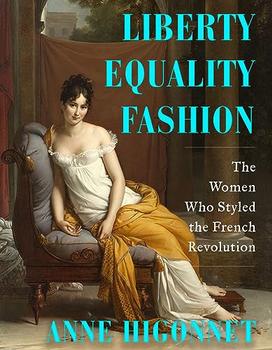Summary | Excerpt | Reviews | Beyond the Book | Readalikes | Genres & Themes | Author Bio

The Women Who Styled the French Revolution
by Anne HigonnetChapter 1
SUMPTUARY DICTATES
(Joséphine)
Three girls went shopping in Paris during the last decade of a monarchy. The right clothes, their families hoped, would help them marry well, so they were led to the intimidating center of European style by their mothers or aunts. Little did the girls know that when a revolution changed everything in 1789, they would become the leaders of the fashion world to which they were being introduced.
Paris boutiques beckoned. Inside a carriage rattling over cobblestone streets sat a sixteen-year-old girl who would one day marry Napoléon Bonaparte and become Empress Joséphine of France. In 1779, she was called Rose, and was being taken by her aunt, Madame Désirée de Renaudin, for a complete Paris makeover. The style in which she had been raised was utterly incorrect.
Rose had come to mainland France from the island colony of Martinique. She was accompanied by a mixed-race servant named Euphémie, who probably still wore clothing brought from the Antilles, as the French called their Caribbean territories. French aristocracy, however, demanded a completely different way of dressing. Rose was never going to forget Martinique style. Even if she was stunned by Paris fashion, with its confidence in its superiority, its centuries of accumulated craft skill, its haughty codes, and its opulent materials, in the back of her mind memories of another kind of elegance lingered.
She had been born on June 23, 1763, named Marie Josèphe Rose Tascher de La Pagerie, and nicknamed Yéyette by her mixed-race nurse, Marion. She lived surrounded by house-servants on one of the many sugar plantations brutally managed by White colonists on the Caribbean islands that French military power had conquered. An intercontinental trade supplied plantation masters with enslaved African labor. On the five-hundred-hectare Martinique estate owned by the Tascher de La Pagerie family, some 330 enslaved Africans labored in cane fields and in the sugar-boiling building, while a few worked in the family house as personal servants. The plantation's area was called "la petite Guinée," Little Guinea, after the part of Africa from which the enslaved had been taken. It was also called "Les Trois Islets" because it was located near three small islands.
The young Rose could not ignore the enslaved people her father owned. When she was very young she was tended day to day by Marion, whom she freed after she became empress. The entire Tascher de La Pagerie family lived literally directly above slave labor. Rose probably could not remember the separate, wooden, house in which her family had lived for the first three years of her life. In 1766, a hurricane blew the wooden house down, inflicting so much financial loss on the plantation that her parents could not afford to rebuild the house and moved into the second floor of their brick sugar-factory building. The first floor housed the plantation's sugar-boiling vats. On a typical Antilles sugar plantation, especially during the harvest season, some enslaved laborers worked night shifts at the boiling vats after day shifts in the cane fields. During these intense night shifts, called veillées, exhaustion frequently led to accidents, in which men lost limbs to the mill cylinders or fell into the vats.
The Black or mixed-race women and men on the Tascher de La Pagerie plantation were among the approximately 85,000 enslaved and about 5,000 nominally free people on Martinique ruled by 11,000 White people, according to a 1685 French royal edict later named the Code Noir. Although the Code Noir ostensibly put limits on torture, the separation of mothers from children, and arbitrary execution, the spirit of the law exempted Whites from punishment for infractions. In 1806, for instance, Rose's mother accused an enslaved house-servant named Emilie of attempting to poison her. Madame Tascher de La Pagerie turned Emilie over to the island tribunal. The interrogation took place one day, the condemnation two days later. For the crime of poisoning a White master, the punishment was death by burning. Execution of the sentence took place the next day.
Excerpted from Liberty Equality Fashion by Anne Higonnet. Copyright © 2024 by Anne Higonnet. Excerpted by permission of W.W. Norton & Company. All rights reserved. No part of this excerpt may be reproduced or reprinted without permission in writing from the publisher.
These are not books, lumps of lifeless paper, but minds alive on the shelves
Click Here to find out who said this, as well as discovering other famous literary quotes!
Your guide toexceptional books
BookBrowse seeks out and recommends the best in contemporary fiction and nonfiction—books that not only engage and entertain but also deepen our understanding of ourselves and the world around us.